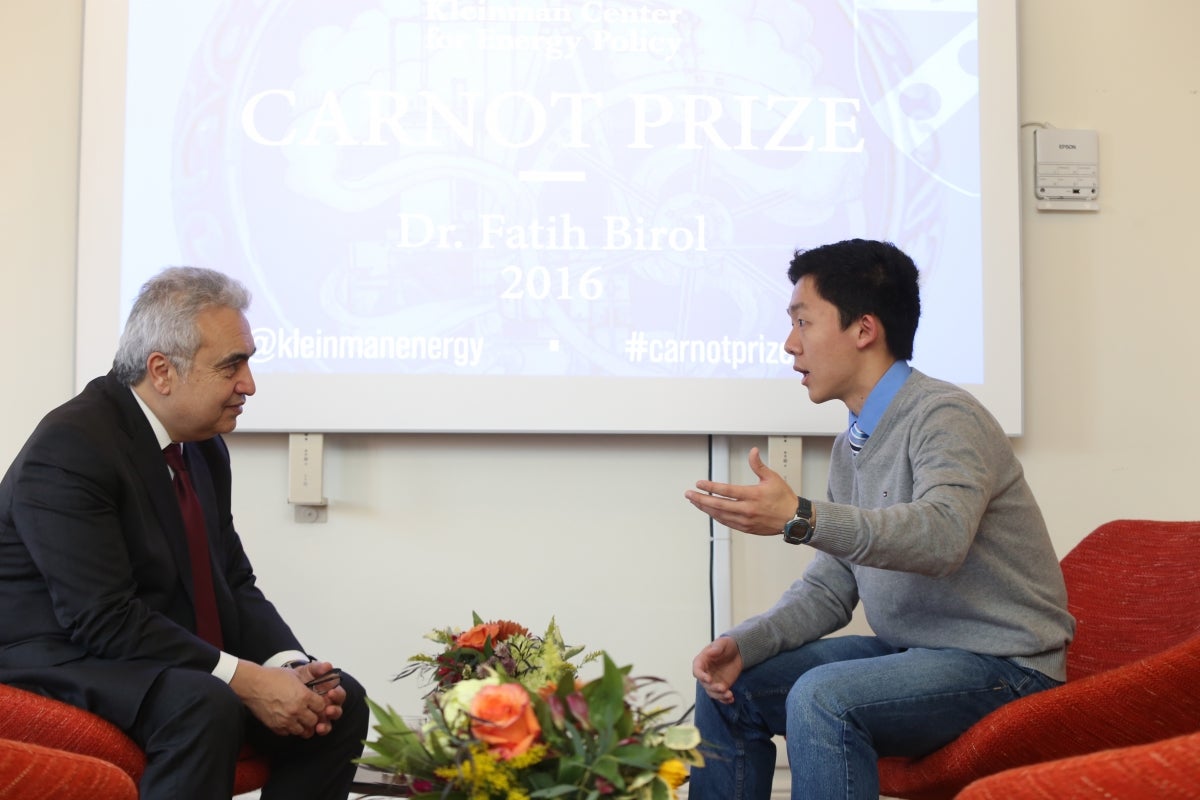
Fatih Birol’s Helicopter View

The global energy industry is in the midst of transformational change as traditional forms of energy such as oil and coal are being replaced by cleaner, renewable alternatives. The Kleinman Center for Energy Policy is excited to have presented the 2016 Carnot Prize to the head of the organization whose singular role is to analyze the evolution of energy markets, and offer insights as nations and economies adapt to a more sustainable, yet uncertain energy future.
Leading the Way in Global Energy Policy
Dr. Fatih Birol, executive director of the International Energy Agency (IEA) in Paris, visited the Kleinman Center on November 17 to accept the Carnot Prize. Carnot recognizes the accomplishments of leaders who have revolutionized our understanding of energy policy. The day before, Dr. Birol launched the IEA’s 2016 World Energy Outlook, widely considered the authoritative analysis of energy markets and their implications for energy security, environmental protection and economic development.
The award comes as Dr. Birol is transforming the IEA, which was established in 1974 to promote energy security in the wake of the Arab oil embargo. While maintaining focus on energy markets, Dr. Birol’s goal is to make the IEA into a clean energy hub that will support the development of new energy technologies and form closer working relationships with developing countries such as China, Indonesia and Brazil.
“I’m extremely happy to receive the Carnot Prize, which is a first step in the collaboration between the University of Pennsylvania’s Kleinman Center and the IEA,” Dr. Birol said in an earlier interview. “Climate and air pollution are challenges, so working with Kleinman is extremely important.”
Launch of IEA Student Fellowship
Dr. Birol has a specific collaboration in mind. In the summer of 2017 the first University of Pennsylvania student will work on fellowship at the IEA in Paris. Dr. Birol sees the fellowship as an opportunity to advance the IEA’s vision through the sharing of knowledge with the university.
The fellowship also reflects Dr. Birol’s focus on preparing students for future energy leadership through mentorship.
“When I was an engineering student at the Technical University of Istanbul there was a professor that made me understand that electricity is the life blood of economic and social life,” he says.
Energy Careers: More than Megawatts
Today, he has two recommendations for students looking to make a career in energy.
“The first is to develop an analytical approach to energy issues,” he says. “The second is to never lose sight of the big picture. Energy is a subset of both the global economy and our daily lives. Thus, it’s important for someone who works in energy to understand how energy relates to everything else, to have a helicopter view of the global economy, what’s happening in other parts of the world, people’s concerns and worries. One shouldn’t lose that perspective.”
He also thinks that energy is a great choice for a profession.
“It’s one of the very few disciplines where you have at least three important advantages if you’re an expert. You can make a difference in people’s lives. Energy issues are extremely interesting, which brings job satisfaction. And you not only make a difference, but you can also earn a good living.”
Focus on a Cleaner Energy Future
Dr. Birol’s own career has reflected the shifting focus from fossil fuels to a more diverse energy industry. He earned his Ph.D. in energy economics from the Technical University of Vienna, and began his career at OPEC in the 1980s. He moved to the IEA in 1995 where his roles have included Chief Economist and Director of Global Energy Economics. He became Director General in 2015 and announced his intention to grow the focus on new energy systems.
Over the years he’s learned from the relationships he’s made. He’s worked closely with U.S. Energy Secretary Ernest Moniz, who provided a video introduction to Dr. Birol at the Carnot award ceremony. “Dr. Moniz has the ability to find tradeoffs between energy and climate priorities, and work toward pragmatic solutions,” Dr. Birol says.
It’s fitting that the Carnot Prize is awarded in Pennsylvania, which Dr. Birol regards as a microcosm of all the energy opportunities and challenges that the U.S. faces.
“Shale gas will continue to be important to reduce the share of coal, but it’s important that the industry get its social license,” he says. “I think the Kleinman Center can play a role here. The industry should grow, but how energy is produced and its impact on the environment need to be watched.”
“The University of Pennsylvania has a gold star reputation, and the Kleinman Center has undertaken important work on energy and climate,” Dr. Birol says.
